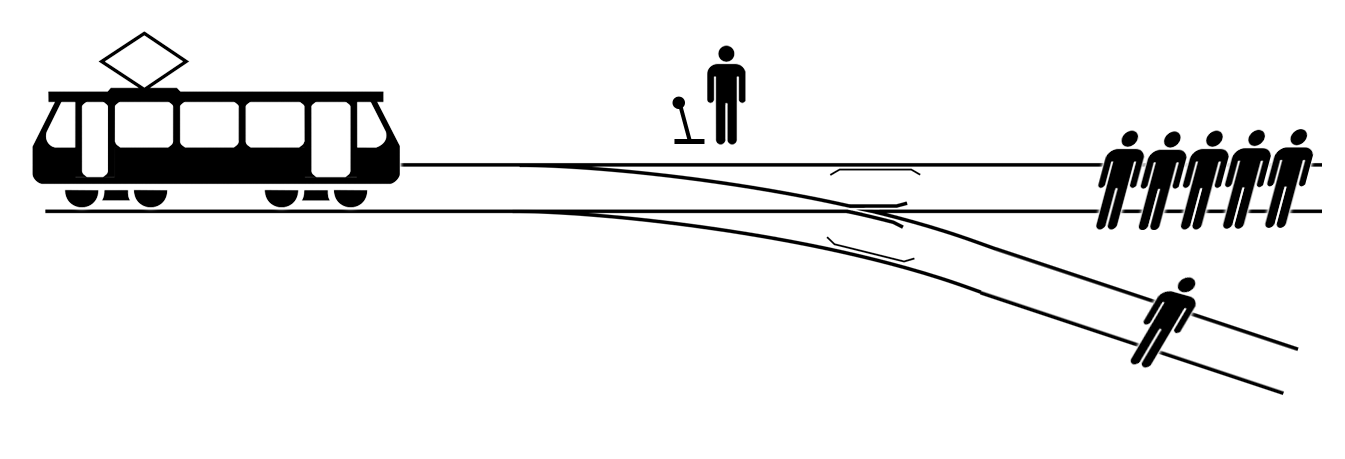3.4 Objective Ethical Theories
LEARNING OBJECTIVES
By the end of this section you will discover:
- Some of the major schools of objective ethical thinking.
- The “Trolley Problem” and how different schools of thinking might respond to it.
Most philosophers are in the business of Normative, not Descriptive Ethics. This means that philosophical ethics attempts to establish rational moral principles that can be used by human beings regardless of their cultural backgrounds. These principles are derived from ethical theories. Ethical theories, while they all consider the full range of moral choice-making, tend to fall into three camps, depending upon which part of the moral choice is viewed as most important: the Motive for action, the Choice or Act itself, or the Consequences of the choice.
Some Approaches to Normative Ethics
|
Focus: |
Consequences |
Act |
Motive |
|
Theories: |
Utilitarianism Ethical Egoism
|
Kantian Ethics Natural Law Ethics |
Virtue Ethics Care Ethics |
|
Important Philosophers: |
Jeremy Bentham John Stuart Mill Ayn Rand |
Immanuel Kant Thomas Aquinas W.D. Ross |
Aristotle Alasdair Macintyre Carol Gilligan
|
|
Ethical Principles |
An action is good if it results in the greatest happiness/pleasure for the most people Individual persons may be used as means toward higher goods An action is good only if it serves my best self-interest (Egoism)
|
An action is morally correct if done from a sense of duty and a commitment to the moral law within An action is morally correct if it can be rationally willed to be applied in all instances An action is morally correct if it recognizes that persons are intrinsic goods and not to be used as instrumental toward other kinds of goods
|
An action is morally correct if it improves my virtue An action is morally correct if it gives preference to those for whom I care (Care ethics) |
For this section, let’s consider the classic “Trolley Problem” made famous in the work of philosopher Philippa Foote.

There is a runaway trolley barreling down the railway tracks. Ahead, on the tracks, there are five people tied up and unable to move. The trolley is headed straight for them. You are standing some distance off in the train yard, next to a lever. If you pull this lever, the trolley will switch to a different set of tracks. However, you notice that there is one person on the sidetrack. You have two (and only two) options:
- Do nothing, in which case the trolley will kill the five people on the main track.
- Pull the lever, diverting the trolley onto the sidetrack where it will kill one person.
Which is the more ethical option? Or, more simply: What is the right thing to do?
Philippa Foot, Trolley Driver and Transplant Problems
Depending upon the ethical theory from which one approaches this question, different reasons or principles will or could result in making different choices.
For example, one might argue that allowing the trolley to kill the one and not the five leads to a greater good for the greatest number of people involved. This would be a sign of consequentialist thinking. The outcomes of a choice determine its worth. On the other hand, you might hold that killing (or allowing the killing of) one is just as bad as killing many. Because ultimately, we cannot know the consequences of our choice (the trolley might fall off the track before any are harmed, right?) the best option is to act upon one’s belief about the choice at hand. To kill is, in Kantian ethics terms, always wrong because people have inherent worth. Probably the best course here would be to recognize that either choice is wrong and make no choice at all. You are not responsible, in this way of thinking, for outcomes, only for your moral choices. Finally, you might be the courageous type who, acting from personal virtue, leaps in front of the trolley in a noble act of heroism to sacrifice yourself in an effort to save others. All of these choices, as you can see, have problems, yet often moral choices have no easy answers. The purpose of exploring the trolley problem was to show the kind of thinking you might employ depending upon which of the three kinds of ethical theories make the most sense to you.
Let’s look first at those theories which hold that the consequences or outcomes of our choices are the most important factors to consider when making moral choices.
Works Cited
Hendricks, Christina.Philippa Foot, Trolley Driver and Transplant Problems.YouTube, YouTube, 5 June 2015, https://www.youtube.com/watch?v=99wc1C_yDIM. Accessed 5 Apr. 2022.
McGeddon. “Trolley Problem.”Wikimedia Commons, Wikimedia Commons, 13 Oct. 2016, https://commons.wikimedia.org/wiki/File:Trolley_problem.png. Accessed 5 Apr. 2022.

